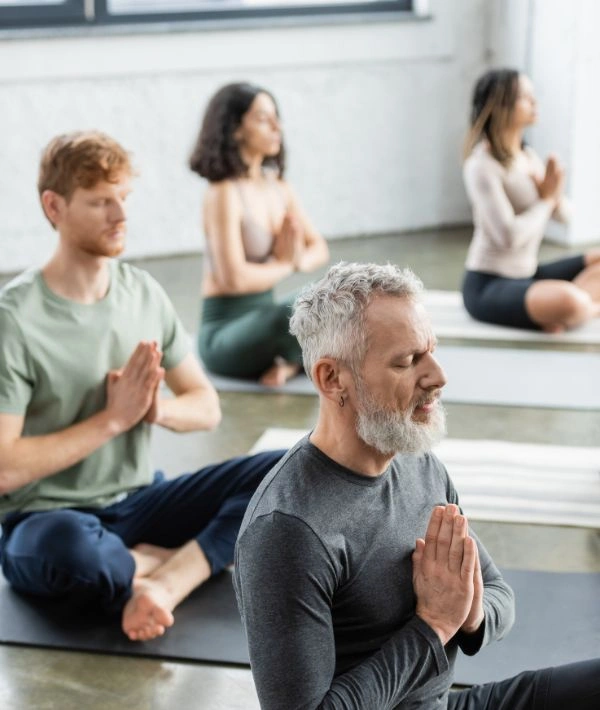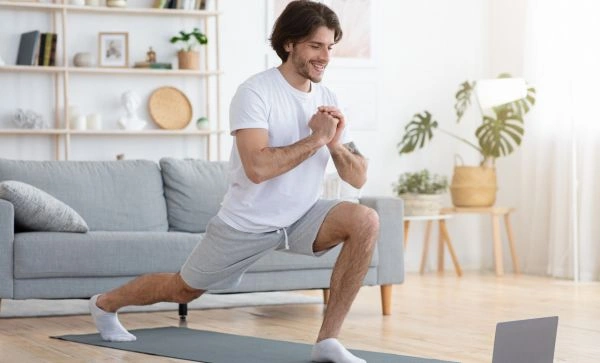Incorporating the Benefits of Yoga With 12 Step Recovery
Are you determined to find lasting sobriety for your own addictive behavior? You may be surprised that there is just as much evidence for recovery in a yoga class as there is for Twelve-Step programs.
But what about blending these two approaches? What can you expect from 12 step recovery yoga when you enroll in a comprehensive treatment program at Ingrained Recovery?
The precepts of yoga and the Twelve Step framework are actually quite similar. Both focus on an open and inclusive group, offer social support, and teach practical tools. They also allow you to dive into a more spiritual lifestyle. The programs are complementary and can both be used in recovery.
Ingrained Recovery offers both traditional and 12 step recovery yoga as part of our regularly scheduled offerings. Here’s why we believe in offering these programs alongside community-based programs like Twelve Step meetings, peer support groups, and as a complement to our full array of holistic treatment approaches.
Get Accredited Treatment Programs at Ingrained Recovery

How Yoga Teachers and 12-Step Recovery Meetings Help You Find Peace
Both yoga and Twelve-Step programs offer help for addictive behavior and should be considered for inclusion in a robust treatment program. Both have core precepts that can help you combat your own addictive behavior, utilizing simple tools and techniques in community-based programs.
Here are a few of the tenets of how you can practice both when dealing with addiction.
Open and Inclusive Groups: Social Benefits of Recovery
Entering treatment can be a scary prospect for many people. They will have to meet new people, share their experiences openly, and accept help from others. This is why it’s imperative to have an open and inclusive group of people who are welcoming to newcomers.
Twelve-Step meetings are always open to new people joining. Each meeting starts with introductions around the room and transitions to the topic of the day. Yoga may not include introductions, but it does set the stage for you to participate and seek help from the rest of the yoga class.
This social connection can lay the groundwork for you to create lasting relationships where you can ask for help when needed. Social supports are a key factor in the early days of recovery and when you want continued abstinence.
Somatic Approach and Practical Tools for Sober Living
One of the best parts of 12-step recovery and yoga therapy is their application of practical tools to put a stop to substance abuse. They lay the framework for you to experience relief from overwhelming urges to turn to drugs and alcohol.
Programs like Alcoholics Anonymous (AA) are filled with coping skills that teach how to live life without drugs and alcohol. From reaching out to a sponsor to meditation, these skills are simple and effective.
Yoga taps into ancient wisdom that allows you to explore how the body copes with addiction. Deep breathing and meditation are core concepts of a rigorous yoga practice. It’s a somatic approach to helping you heal using very practical tools that you can access anywhere at any time.
Get Proven Detox and Rehab Options at Ingrained

Increased Self-Esteem and Confidence
The goal of the Twelve Step framework is to help you confidently live a life without drugs and alcohol. As you work the steps, you become more certain of your ability to weather any cravings that occur.
Yoga teachers instill a similar feeling of confidence in their students. The more you practice yoga, the more likely it is that your self-esteem will increase. Self-esteem contributes to confidence and can allow you the freedom needed to explore alternatives to drug and alcohol use.
By practicing what researchers call “open and expansive poses,” you increase your feeling of personal control and power. These poses might be what you need to give you a sense that you can accomplish your goals without having to turn to substance abuse.
Spiritual Principles to Help You Live Without Addictive Behavior
When someone with addiction issues lives their life sober, they often require help to tap into their beliefs that can keep them happy and healthy. This often means accessing spiritual foundations that stress the belief in some sort of higher power.
Twelve-Step recovery meeting topics in AA (and NA meeting topics) introduce spiritual concepts early, usually in the second step. The group is encouraged to admit that a Power greater than themselves can help them restore them to sanity or sober living.
Much like the Twelve Step framework, yoga teachers encourage their students to dig deep spiritually as they work through the poses. It introduces the concepts of mindfulness, making them real outside of the therapy room. Once someone is open to the present moment, they can start to tap into that sense of increased spirituality.
For those who want to dive deep into a yoga practice, they can integrate the eight limbs (yamas) of the practice into their physical postures (asanas).
Y12 Yoga Classes to Supplement Twelve-Step Programs

In addition to the benefits of traditional yoga, many people affected by addictive behavior will want to explore the official school of Y12. This offering incorporates the practice of both programs in one fell swoop. You get the experience of being in touch with the body while working through therapeutic skills.
Enrollment in Y12 classes teaches you new coping skills and tips for mindfulness while in the company of like-minded people. It’s a community-based approach to healing that complements the principles taught in 12 Step Facilitation therapy.
Ingrained Recovery is conveniently located about twenty minutes from a thriving Y12 meeting in Dublin, Georgia. We also offer both traditional and 12-step recovery yoga classes as part of our schedule when it comes to your robust treatment.
Up To 100% of Rehab Costs Covered By Insurance
Embrace Yoga and Twelve-Step Recovery at Ingrained
Anyone dealing with addiction will need to get some support to kick their habit once and for all. While many people find success in 12-step programs in the community, these are supplemented with more holistic therapies at robust treatment centers like Ingrained Recovery. Our yoga classes can help you through tough times.
Call today and let our admissions team answer your questions, verify your insurance benefits, and help you enroll in the programs that are right for you!
References
- Islam, M. F., Guerrero, M., Nguyen, R. L., Porcaro, A., Cummings, C., Stevens, E., Kang, A., & Jason, L. A. (2023). The Importance of Social Support in Recovery Populations: Toward a Multilevel Understanding. Alcoholism treatment quarterly, 41(2), 222–236.
- Kuppili, P. P., Parmar, A., Gupta, A., & Balhara, Y. P. S. (2018). Role of Yoga in Management of Substance-use Disorders: A Narrative Review. Journal of neurosciences in rural practice, 9(1), 117–122.
- Golec de Zavala, A., Lantos, D., & Bowden, D. (2017). Yoga Poses Increase Subjective Energy and State Self-Esteem in Comparison to ‘Power Poses’. Frontiers in psychology, 8, 752.
- Csala, B., Springinsfeld, C. M., & Köteles, F. (2021). The Relationship Between Yoga and Spirituality: A Systematic Review of Empirical Research. Frontiers in psychology, 12, 695939.
